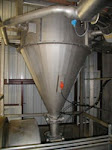ESYM Looks like it landed a big financing deal today. So what does it mean for GERS??? I sure do not know for sure, but I found something rather interesting in the diferences in detail between the ESYM PR and the filing. I EMBOLDEN IN BLUE THE INTERESTING PART:
From the ESYM PR TODAY
EcoSystem will use the investment proceeds to acquire distressed ethanol production facilities, to acquire other strategically-compatible assets, and to develop and integrate EcoSystem’s Cellulosic Corn™ technologies into EcoSystem’s planned ethanol production facilities.
http://www.eco-system.com/news.php?id=254
NOW TAKE A LOOK AT THE FILING:
Under the terms of the USA, the Company is permitted to use the Senior Purchase Price proceeds to facilitate
(1) the acquisition by the Company of several distressed corn ethanol production facilities,
(2) the acquisition and/or construction by the Company of existing corn oil extraction facilities and/or other strategically compatible cash flow producing assets, and
(3) the development and integration of the Company’s Cellulosic Corn™ technologies into the Company’s acquired corn ethanol plants.
http://www.eco-system.com/pdf/ESYM_Form_8K_Senior_Investment_7-30-09.pdf
Notice that EYSM intends to use at least a portion of this $76M for the acquisition and construction of Corn oil extraction facilities. Will they purchase enough of the GERS COES to lift the "demon" debt off the back of GERS?? Will this then allow for the bean counters to give a thumbs up on financing for the COES backlog??
Good Luck to Investors,
SkunK
Thursday, July 30, 2009
GreenShift featured as Partner on new ESYM Website
Click on Greenshift @
http://www.eco-system.com/cellulosic.php?mode=3&show=true
GreenShift Corporation develops and commercializes clean technologies that facilitate the efficient use of natural resources. GreenShift does this today by developing and using innovative technologies to produce biomass-derived and other carbon-neutral products at enhanced cost and risk profiles by extracting and refining raw materials that other producers cannot access or process.GreenShift’s patent-allowed corn oil extraction technologies are widely considered to be the quickest path for margin improvement for corn ethanol producers today.
GreenShift has proven that it can extract upwards of 6.5 million gallons of corn oil per year for every 100 million gallons of ethanol produced. This corresponds to a 7% increase in the gallons of biofuel produced per bushel of corn from 2.8 to 3.0 gallons per bushel and about a 21% reduction in the energy utilization of ethanol production. And, by reducing the energy use at the ethanol plant and refining biofuel from the recovered corn oil, which would otherwise go to animal feed, not energy, the greenhouse gas emissions attributed to ethanol production are reduced by an incredible 29%.
GreenShift owns a number of corn oil extraction facilities and is under contract to install additional facilities corresponding to more than 40 million gallons per year of corn oil at ethanol facilities throughout the U.S. GreenShift has also invested in several other technologies, including the technologies licensed to EcoSystem for its Cellulosic Corn™ portfolio. These technologies include a number of (a) feedstock conditioning, (b) oil production, extraction and refining, and (c) energy and carbon mitigation technologies.
Good Luck to Investors,
SkunK
http://www.eco-system.com/cellulosic.php?mode=3&show=true
GreenShift Corporation develops and commercializes clean technologies that facilitate the efficient use of natural resources. GreenShift does this today by developing and using innovative technologies to produce biomass-derived and other carbon-neutral products at enhanced cost and risk profiles by extracting and refining raw materials that other producers cannot access or process.GreenShift’s patent-allowed corn oil extraction technologies are widely considered to be the quickest path for margin improvement for corn ethanol producers today.
GreenShift has proven that it can extract upwards of 6.5 million gallons of corn oil per year for every 100 million gallons of ethanol produced. This corresponds to a 7% increase in the gallons of biofuel produced per bushel of corn from 2.8 to 3.0 gallons per bushel and about a 21% reduction in the energy utilization of ethanol production. And, by reducing the energy use at the ethanol plant and refining biofuel from the recovered corn oil, which would otherwise go to animal feed, not energy, the greenhouse gas emissions attributed to ethanol production are reduced by an incredible 29%.
GreenShift owns a number of corn oil extraction facilities and is under contract to install additional facilities corresponding to more than 40 million gallons per year of corn oil at ethanol facilities throughout the U.S. GreenShift has also invested in several other technologies, including the technologies licensed to EcoSystem for its Cellulosic Corn™ portfolio. These technologies include a number of (a) feedstock conditioning, (b) oil production, extraction and refining, and (c) energy and carbon mitigation technologies.
Good Luck to Investors,
SkunK
Monday, July 27, 2009
GreenShift Provides Bioreactor License to Carbonics Capital Corporation
GreenShift’s patented and patent-pending bioreactor technologies rely on thermophillic cyanobacteria (among other organisms) to consume carbon dioxide emissions and to produce carbon-neutral products. The organisms use the available carbon dioxide in the emissions and water to grow and give off oxygen and water vapor. The organisms also absorb nitrogen oxide and sulfur dioxide. All photosynthetic organisms need a supply of carbon dioxide, light, a growth media and water with nutrients to live and grow. GreenShift’s bioreactor technologies have the potential to reduce the costs and technical barriers to managing the flow resources into, through and out of the bioreactor in a compact and cost-efficient way as compared to other algae bioreactor technologies.
David Winsness, GreenShift’s Chief Technology Officer, added that “GreenShift is exclusively focused on the commercialization needs of its patent-pending extraction technologies. While we originally acquired our bioreactor technologies with a long-term goal of developing applications capable of integrating into corn ethanol plants, these technologies have many other applications. The Carbonics team has the ability to evaluate and develop those applications, and to manage the continued evolution of our bioreactor technologies.”
Under the terms of the license agreement, Carbonics will pay GreenShift ten percent of the pre-tax net income derived from the use of the technology or derived from the sale, sublicense or lease of technology related equipment. In addition, while GreenShift shall retain ownership of all improvements that Carbonics may develop, and the right to use any such improvements in GreenShift’s ethanol applications, Carbonics shall retain the right to use those improvements under the license agreement.
See entire Article Here:
http://www.businesswire.com/portal/site/google/?ndmViewId=news_view&newsId=20090727005321&newsLang=en
David Winsness, GreenShift’s Chief Technology Officer, added that “GreenShift is exclusively focused on the commercialization needs of its patent-pending extraction technologies. While we originally acquired our bioreactor technologies with a long-term goal of developing applications capable of integrating into corn ethanol plants, these technologies have many other applications. The Carbonics team has the ability to evaluate and develop those applications, and to manage the continued evolution of our bioreactor technologies.”
Under the terms of the license agreement, Carbonics will pay GreenShift ten percent of the pre-tax net income derived from the use of the technology or derived from the sale, sublicense or lease of technology related equipment. In addition, while GreenShift shall retain ownership of all improvements that Carbonics may develop, and the right to use any such improvements in GreenShift’s ethanol applications, Carbonics shall retain the right to use those improvements under the license agreement.
See entire Article Here:
http://www.businesswire.com/portal/site/google/?ndmViewId=news_view&newsId=20090727005321&newsLang=en
Monday, July 20, 2009
Bio to Triple in Ten Years
According to a report by Pike Research, the combined global biodiesel and ethanol markets will reach $247 billion in sales by 2020 despite the current lull in industry investment. This would be up from $76 billion in sales projected for 2010.
The company predicts three big waves in biodiesel feedstock development, beginning in 2010 with widespread availability of waste grease biodiesel, followed by major advancements in jatropha biodiesel supply by 2014, climaxing in 2016 when Pike Research predicts commercially available algae biodiesel “will have a deeper effect on the market.”
See Article Here in August 2009 edition of BioDiesel Magazine:
http://www.biodieselmagazine.com/article.jsp?article_id=3600
SkunK
The company predicts three big waves in biodiesel feedstock development, beginning in 2010 with widespread availability of waste grease biodiesel, followed by major advancements in jatropha biodiesel supply by 2014, climaxing in 2016 when Pike Research predicts commercially available algae biodiesel “will have a deeper effect on the market.”
See Article Here in August 2009 edition of BioDiesel Magazine:
http://www.biodieselmagazine.com/article.jsp?article_id=3600
SkunK
Wednesday, July 15, 2009
New 14C as of 15July2009
Monday, July 13, 2009
(Amendment No. 1)
PRE 14C
FILED AS OF DATE: 20090713
20090713163900
It looks like the par value has been reduced. Here are some of the changes to the Pre-14C:
All of the outstanding convertible debentures are convertible into common stock based on the market price of the common stock at the time of conversion. The table on the above assumes a conversion rate of $.00675. At the close of business on July 9, 2009 the market price was $.0041. If the debentures were converted based on that price, approximately 50% more shares of common stock would be required. In order to be prepared for the possibility of lower conversion rates, the Board of Directors and majority shareholders have agreed to increase the authorized common stock to 10 billion shares and have authorized a reduction in the par value of the common stock. The secondary reason why the Board of Directors and the majority shareholder have approved the increase in authorized common stock is to provide GreenShift with flexibility in pursuing its long-term business objectives. Additional reasons for the increase include:
>> Management plans in the future to pursue opportunities to obtain the capital in order to fully implement GreenShift's business plan. A reserve of both common and preferred shares available for issuance from time-to-time will enable GreenShift to entertain a broad variety of financing proposals.
>> Management may utilize the additional shares in connection with corporate acquisitions, joint venture arrangements, or for other corporate purposes, including the solicitation and compensation of key personnel. Management has not entered into any commitment to issue any shares except upon conversion of the outstanding debentures. Moreover, Management has no plans at this time that will involve the issuance of additional shares, other than a general plan to pursue additional financing. Management has not, however, discussed the terms of any specific financing with any potential investor.
The reduction in the par value of the common stock means that the Board will be authorized to issue common stock for as little as $.0001 per share, and that possibility may have a negative effect on the market price for the common stock.
*********
The SkunK has run a merge document on the two documents and tried to post it on the blog - but no luck. You can copy/paste the two into seperate word documents - then run "tools" "compare and merge" so you can see ALL the changes - even the punctuation!
http://www.sec.gov/Archives/edgar/data/1269127/000126912709000066/gers14c-a71309.txt
Still Working,
SkunK
FILED AS OF DATE: 20090713
It looks like the par value has been reduced. Here are some of the changes to the Pre-14C:
All of the outstanding convertible debentures are convertible into common stock based on the market price of the common stock at the time of conversion. The table on the above assumes a conversion rate of $.00675. At the close of business on July 9, 2009 the market price was $.0041. If the debentures were converted based on that price, approximately 50% more shares of common stock would be required. In order to be prepared for the possibility of lower conversion rates, the Board of Directors and majority shareholders have agreed to increase the authorized common stock to 10 billion shares and have authorized a reduction in the par value of the common stock. The secondary reason why the Board of Directors and the majority shareholder have approved the increase in authorized common stock is to provide GreenShift with flexibility in pursuing its long-term business objectives. Additional reasons for the increase include:
>> Management plans in the future to pursue opportunities to obtain the capital in order to fully implement GreenShift's business plan. A reserve of both common and preferred shares available for issuance from time-to-time will enable GreenShift to entertain a broad variety of financing proposals.
>> Management may utilize the additional shares in connection with corporate acquisitions, joint venture arrangements, or for other corporate purposes, including the solicitation and compensation of key personnel. Management has not entered into any commitment to issue any shares except upon conversion of the outstanding debentures. Moreover, Management has no plans at this time that will involve the issuance of additional shares, other than a general plan to pursue additional financing. Management has not, however, discussed the terms of any specific financing with any potential investor.
The reduction in the par value of the common stock means that the Board will be authorized to issue common stock for as little as $.0001 per share, and that possibility may have a negative effect on the market price for the common stock.
*********
The SkunK has run a merge document on the two documents and tried to post it on the blog - but no luck. You can copy/paste the two into seperate word documents - then run "tools" "compare and merge" so you can see ALL the changes - even the punctuation!
http://www.sec.gov/Archives/edgar/data/1269127/000126912709000066/gers14c-a71309.txt
Still Working,
SkunK
Thursday, July 9, 2009
SkunK Call to Action
The SkunK has already sent a message to the EPA in support of the move to 15% ethanol. If you haven't done so - the third link below is the easiest way I found. You have until July 20th.
But first - if you have any doubts - or if you just want the facts to address the Big Oil and Big Food industry propaganda, here is a great, simple source:
Frequently Asked Questions about the E15 Waiver
http://www.ethanol.org/magazine/index.php?id=115&parentid=110
Read a study showing how 136,000 new direct jobs could be created just by moving from E10 to E15, plus more than 260,000 secondary jobs: "Economic Impacts of Increasing the Ethanol Blend Limit"
Now here is that direct path to tell the EPA to go to 15%! Simple. Fast.
http://capwiz.com/ethanol/issues/alert/?alertid=13288686&PROCESS=Take+Action
Already made your opinion known to the EPA? Fired up to take more action? Here are ten steps to take!
http://www.ethanol.org/magazine/index.php?id=4
Good Luck to Investors,
SkunK
ps. I plan to leave the ICON on the top right up for at least the next ten days. You put in your zip and it allows you to write/email your state Representatives and/or Congressional delegation or other key people to let them know you support Ethanol.
But first - if you have any doubts - or if you just want the facts to address the Big Oil and Big Food industry propaganda, here is a great, simple source:
Frequently Asked Questions about the E15 Waiver
http://www.ethanol.org/magazine/index.php?id=115&parentid=110
Read a study showing how 136,000 new direct jobs could be created just by moving from E10 to E15, plus more than 260,000 secondary jobs: "Economic Impacts of Increasing the Ethanol Blend Limit"
Now here is that direct path to tell the EPA to go to 15%! Simple. Fast.
http://capwiz.com/ethanol/issues/alert/?alertid=13288686&PROCESS=Take+Action
Already made your opinion known to the EPA? Fired up to take more action? Here are ten steps to take!
http://www.ethanol.org/magazine/index.php?id=4
Good Luck to Investors,
SkunK
ps. I plan to leave the ICON on the top right up for at least the next ten days. You put in your zip and it allows you to write/email your state Representatives and/or Congressional delegation or other key people to let them know you support Ethanol.
Wednesday, July 8, 2009
Increasing Equity at About 50 Cents per Gallon
"OMAHA (DTN) -- A significant drop in corn prices has led to a change of fortune for DTN's hypothetical 50-million-gallon ethanol plant, Neeley Biofuels Inc.
Since our June 15 update when we reported that the plant was drawing closer to break-even with a 2-cent loss, a drop in corn price has Neeley Biofuels turning an 18-cent-per-gallon profit as of Wednesday
DTN Senior Analyst Darin Newsom said chances are good that corn prices could continue to fall in the next month or two.
"Initial support could be found near $3.30 in late August," he said. "However, if volatility remains high and this support fails to hold the nearby contract could slide back to $3, possibly $2.90."
Though Neeley Biofuels is paying nearly $16 million in debt-service and depreciation costs on its plant -- or about 32 cents per gallon of ethanol produced -- many real plants are not in debt.
If Neeley Biofuels was not in debt, July 2 profits would be about 50 cents per gallon."
See Entire Article Here:
http://www.dtnethanolcenter.com/index.cfm?show=10&pid=48&mid=80
**********
If we figure that Global Ethanol has no debt on its 160mm capacity @ Lakota and Riga - It could be bringing in about 220K everyday in profits under these conditions. With even lower corn prices predicted and another record harvest on the horizon - more and more money should flood back into this industry.
SkunK
Since our June 15 update when we reported that the plant was drawing closer to break-even with a 2-cent loss, a drop in corn price has Neeley Biofuels turning an 18-cent-per-gallon profit as of Wednesday
DTN Senior Analyst Darin Newsom said chances are good that corn prices could continue to fall in the next month or two.
"Initial support could be found near $3.30 in late August," he said. "However, if volatility remains high and this support fails to hold the nearby contract could slide back to $3, possibly $2.90."
Though Neeley Biofuels is paying nearly $16 million in debt-service and depreciation costs on its plant -- or about 32 cents per gallon of ethanol produced -- many real plants are not in debt.
If Neeley Biofuels was not in debt, July 2 profits would be about 50 cents per gallon."
See Entire Article Here:
http://www.dtnethanolcenter.com/index.cfm?show=10&pid=48&mid=80
**********
If we figure that Global Ethanol has no debt on its 160mm capacity @ Lakota and Riga - It could be bringing in about 220K everyday in profits under these conditions. With even lower corn prices predicted and another record harvest on the horizon - more and more money should flood back into this industry.
SkunK
Monday, July 6, 2009
What if??
The SkunK doesn't spend much time on this blog talking about Global Warming or Peak Oil Theory. But this next story was just too much to pass up. This is the first time I have seen someone who says both are real - but don't worry - one will fix the other. Regardless where you stand on either issue, you have to appreciate the self-regulating symmetry.
****************
Or to use a SkunK-a-thong* Analogy: King Kong invaded your city. But don't worry 'cause a huge fire breathing dragon - Godzilla - will "take care" of him. Hey I saw that movie - Don't a lot of little people get stepped on? At least those aren't corn oil railroad tankers he's chewing on!!!
****************
 "Peak OIL May Solve the Climate Change Problem without Regulation."
"Peak OIL May Solve the Climate Change Problem without Regulation."
"Intuitively, anyone who recognizes the practical limitations on fossil energy supply knows emissions will not rise exponentially for another century, as portrayed by the IPCC and the US Global Climate Change Research Program (ref-1). The forecast growth rate in energy consumption—1.4% per year—is not very large, but compounded over a century it would suggest that by 2100 we would be consuming three times more energy than we consume today.
In the meantime, we will have consumed about 15 trillion barrels-of-oil-equivalent.
That is an astounding number considering we only have about 13 trillion barrels-equivalent in oil, gas, coal, oil sands, heavy oil and oil shale combined. And only a portion of this total, perhaps no more than one-third, can ultimately be recovered under reasonable economic conditions."
He believes that "oil is peaking about now," while gas and coal will do follow "within a couple of decades." He argues that "unrealistic" expectations of future fossil fuel energy supply are "but one glaring error in the climate change science."
 "Rather than making the problem worse through regulation, political effort should be better spent on improving efficiency of energy use, and helping to ensure we have adequate domestic supply of fuels when the world-wide competition for dwindling supply begins in earnest. That time is not long from now."
"Rather than making the problem worse through regulation, political effort should be better spent on improving efficiency of energy use, and helping to ensure we have adequate domestic supply of fuels when the world-wide competition for dwindling supply begins in earnest. That time is not long from now."
See rest of article here:
http://evworld.com/blogs/index.cfm?authorid=12&blogid=775&archive=1
SkunK
*Thong: Something that barely hides . . .
****************
Or to use a SkunK-a-thong* Analogy: King Kong invaded your city. But don't worry 'cause a huge fire breathing dragon - Godzilla - will "take care" of him. Hey I saw that movie - Don't a lot of little people get stepped on? At least those aren't corn oil railroad tankers he's chewing on!!!
****************
 "Peak OIL May Solve the Climate Change Problem without Regulation."
"Peak OIL May Solve the Climate Change Problem without Regulation.""Intuitively, anyone who recognizes the practical limitations on fossil energy supply knows emissions will not rise exponentially for another century, as portrayed by the IPCC and the US Global Climate Change Research Program (ref-1). The forecast growth rate in energy consumption—1.4% per year—is not very large, but compounded over a century it would suggest that by 2100 we would be consuming three times more energy than we consume today.
In the meantime, we will have consumed about 15 trillion barrels-of-oil-equivalent.
That is an astounding number considering we only have about 13 trillion barrels-equivalent in oil, gas, coal, oil sands, heavy oil and oil shale combined. And only a portion of this total, perhaps no more than one-third, can ultimately be recovered under reasonable economic conditions."
He believes that "oil is peaking about now," while gas and coal will do follow "within a couple of decades." He argues that "unrealistic" expectations of future fossil fuel energy supply are "but one glaring error in the climate change science."
 "Rather than making the problem worse through regulation, political effort should be better spent on improving efficiency of energy use, and helping to ensure we have adequate domestic supply of fuels when the world-wide competition for dwindling supply begins in earnest. That time is not long from now."
"Rather than making the problem worse through regulation, political effort should be better spent on improving efficiency of energy use, and helping to ensure we have adequate domestic supply of fuels when the world-wide competition for dwindling supply begins in earnest. That time is not long from now."See rest of article here:
http://evworld.com/blogs/index.cfm?authorid=12&blogid=775&archive=1
SkunK
*Thong: Something that barely hides . . .
Thursday, July 2, 2009
Sustainable Systems - SOLD!
Hopefully, this has just become a pure corn oil extraction/ethanol plant service play. Lets build out the backlog with no distractions. Ever since operations at NextDiesel and Sustainable were shut down due to deteriorating market conditions, these non-revenue producing entities have not helped at the financing table. Being a pure play this may make financing easier.
As stated in the 1Q, Nextdiesel [BIG] buy was going to be "undone" utilizing the rescission feature of the original buy during the period of the 2Q.
"Instead, the Company intends to facilitate rescission of the original acquisition transaction and the divestiture of BIG [NextDiesel] during the quarter ended June 30, 2009 due to changed market circumstances." p.10 1Q
ALSO
". . . the Company intends to divest of the majority, and probably all, of its equity holdings in Sustainable during the second quarter 2009." p.11 1Q
According to the SkunK Q & A of two weeks ago, concerning the two pending divestitures, the CEO stated:
"One is complete. Our goal is to have both completed by the end of the quarter."
http://greenshift-gers.blogspot.com/2009/06/new-q-with-ceo.html
So when Carbonics Capital named Paul T. Miller as President and CEO and they stated they hoped to purchase Sustainable LLC, we knew that deal was not done yet. So that left the NextDiesel deal having already been completed. Today we learn that the Sustainable Sale was done on 30 June. This is the last day of the 2nd Quarter. Just as planned.
So the SkunK has just taken us through the saga of the Company telling us what they are gonna do, doing it, and now telling us they did it.
**********
Effective June 30, 2009, pursuant to a Stock Purchase Agreement dated as of that date, GS AgriFuels Corporation, GreenShift's wholly-owned subsidiary, sold the capital stock of Sustainable Systems, Inc. ("Sustainable") to Carbonics Capital Corporation in return for the assumption of $4,000,000 of GS AgriFuels' debt due to YA Global Investments, L.P. ("YA Global").
To record the assumption of liability, Carbonics Capital Corporation issued to YA Global a secured convertible debenture dated as of June 30, 2009 in the principal amount of $4,000,000. The debenture has an annual interest rate of 12% and it matures on December 31, 2010. The debenture is secured by a first priority security position on the assets of Carbonics Capital Corporation. The debenture is guaranteed by GS AgriFuels and GreenShift Corporation, and by the majority shareholder of both GreenShift and Carbonics Capital, which is Viridis Capital, LLC.
http://www.sec.gov/Archives/edgar/data/1269127/000126912709000060/gers8k7209.txt
SkunK
As stated in the 1Q, Nextdiesel [BIG] buy was going to be "undone" utilizing the rescission feature of the original buy during the period of the 2Q.
"Instead, the Company intends to facilitate rescission of the original acquisition transaction and the divestiture of BIG [NextDiesel] during the quarter ended June 30, 2009 due to changed market circumstances." p.10 1Q
ALSO
". . . the Company intends to divest of the majority, and probably all, of its equity holdings in Sustainable during the second quarter 2009." p.11 1Q
According to the SkunK Q & A of two weeks ago, concerning the two pending divestitures, the CEO stated:
"One is complete. Our goal is to have both completed by the end of the quarter."
http://greenshift-gers.blogspot.com/2009/06/new-q-with-ceo.html
So when Carbonics Capital named Paul T. Miller as President and CEO and they stated they hoped to purchase Sustainable LLC, we knew that deal was not done yet. So that left the NextDiesel deal having already been completed. Today we learn that the Sustainable Sale was done on 30 June. This is the last day of the 2nd Quarter. Just as planned.
So the SkunK has just taken us through the saga of the Company telling us what they are gonna do, doing it, and now telling us they did it.
**********
Effective June 30, 2009, pursuant to a Stock Purchase Agreement dated as of that date, GS AgriFuels Corporation, GreenShift's wholly-owned subsidiary, sold the capital stock of Sustainable Systems, Inc. ("Sustainable") to Carbonics Capital Corporation in return for the assumption of $4,000,000 of GS AgriFuels' debt due to YA Global Investments, L.P. ("YA Global").
To record the assumption of liability, Carbonics Capital Corporation issued to YA Global a secured convertible debenture dated as of June 30, 2009 in the principal amount of $4,000,000. The debenture has an annual interest rate of 12% and it matures on December 31, 2010. The debenture is secured by a first priority security position on the assets of Carbonics Capital Corporation. The debenture is guaranteed by GS AgriFuels and GreenShift Corporation, and by the majority shareholder of both GreenShift and Carbonics Capital, which is Viridis Capital, LLC.
http://www.sec.gov/Archives/edgar/data/1269127/000126912709000060/gers8k7209.txt
SkunK
This Fall: Corn Supply up, Soy Supply down
Two reports released today by the Agriculture Department show a big jump in both planted acreage and stocks for corn, pointing to greater corn supplies this year, which could encourage the Environmental Protection Agency to increase its ethanol blend rate, according to Terry Francl, senior economist with the American Farm Bureau Federation.
“For the 2009/2010, the greater availability of corn supplies makes it more likely that the EPA will increase the ethanol blend rate from the current 10 percent to 12 percent or 13 percent, effective Jan. 1, 2010,”
/////////////
As for soybeans, Francl said the 12 percent drop in soybean stocks, compared to June 1 of last year, points to a very tight supply-and-demand balance for the current crop year that ends in August. “Soybean supplies are very tight which implies further price rationing may still be needed,” Francl said.
Rest of Article Here:
http://www.fb.org/index.php?fuseaction=newsroom.newsfocus&year=2009&file=nr0630.html
**************
The SkunK sees two good things in this article. First of all, with an increase in the ethanol percentage from 10% to 12, 13 or even 15%, ethanol demand will remain high and cover increased corn supplies. This in an increasingly healthy, expanding ethanol industry.
Second, with soybeans in short supply, the price of soy oil will remain high - and unless diesel prices skyrocket - it will remain inefficient to create biodiesel with soy. The pressure for corn oil extraction to achieve biodiesel mandates - and provide a workable feedstock for the biodiesel industry should therefore increase.
One more important note about corn production. With higher corn prices over the last couple years, many farmers have found it possible to invest in irrigation. I am not talking about the desert here. Many places where corn grows just fine without irrigation. But supplemental irrigation provides consistency in dry years and increased yields in even normal years. The corn is sure to get water "exactly" when it needs it. My point is this additional capital investment will lead to increased yields and supply that are in addition to the overall acreage planted.
**************
Thanks to Todd Neeley's article and his lead on this topic. Note his comment about whether we go to 12, 13 or 15% from the present 10% ethanol mix:
http://www.dtnprogressivefarmer.com/dtnag/common/link.do?symbolicName=/ag/blogs/template1&blogHandle=ethanol&blogEntryId=8a82c0bc22179937012237114e3801ab
Good Luck to Investors,
SkunK
“For the 2009/2010, the greater availability of corn supplies makes it more likely that the EPA will increase the ethanol blend rate from the current 10 percent to 12 percent or 13 percent, effective Jan. 1, 2010,”
/////////////
As for soybeans, Francl said the 12 percent drop in soybean stocks, compared to June 1 of last year, points to a very tight supply-and-demand balance for the current crop year that ends in August. “Soybean supplies are very tight which implies further price rationing may still be needed,” Francl said.
Rest of Article Here:
http://www.fb.org/index.php?fuseaction=newsroom.newsfocus&year=2009&file=nr0630.html
**************
The SkunK sees two good things in this article. First of all, with an increase in the ethanol percentage from 10% to 12, 13 or even 15%, ethanol demand will remain high and cover increased corn supplies. This in an increasingly healthy, expanding ethanol industry.
Second, with soybeans in short supply, the price of soy oil will remain high - and unless diesel prices skyrocket - it will remain inefficient to create biodiesel with soy. The pressure for corn oil extraction to achieve biodiesel mandates - and provide a workable feedstock for the biodiesel industry should therefore increase.
One more important note about corn production. With higher corn prices over the last couple years, many farmers have found it possible to invest in irrigation. I am not talking about the desert here. Many places where corn grows just fine without irrigation. But supplemental irrigation provides consistency in dry years and increased yields in even normal years. The corn is sure to get water "exactly" when it needs it. My point is this additional capital investment will lead to increased yields and supply that are in addition to the overall acreage planted.
**************
Thanks to Todd Neeley's article and his lead on this topic. Note his comment about whether we go to 12, 13 or 15% from the present 10% ethanol mix:
http://www.dtnprogressivefarmer.com/dtnag/common/link.do?symbolicName=/ag/blogs/template1&blogHandle=ethanol&blogEntryId=8a82c0bc22179937012237114e3801ab
Good Luck to Investors,
SkunK
Subscribe to:
Posts (Atom)











